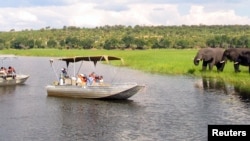Botswana, home to the world's largest elephant population, will break ranks with its southern African neighbors and not support bids at an upcoming U.N. conference to allow sales of ivory, its president says.
Trade in ivory will take center stage at the meeting of the U.N.'s Convention on International Trade in Endangered Species (CITES) in Johannesburg September 24 to October 5.
South Africa Environment Minister Edna Molewa said Tuesday that the Southern African Development Community would take a united stand and support Namibian and Zimbabwean proposals to be allowed to sell ivory, a coveted commodity used for carving and jewelry.
But Botswana President Ian Khama has told Reuters his nation will not support loosening restrictions on the trade.
"We're opposed to that. ... We need to keep elephants on Appendix I so that there's no trade in ivory," he said in an interview. Animals listed on CITES' Appendix I are afforded the highest level of protection, and global trade in products derived from them is prohibited.
Botswana will be joining Kenya and other African nations seeking to snuff the trade out completely.
Stable populations
Southern Africa's elephant populations — with notable exceptions, such as those in Mozambique — have grown or stabilized, in contrast to the rest of the continent, where the animals are being depleted by poachers to feed an illicit market. The bulk of the demand comes from Asia.
"We shouldn't think that because we are doing well we should be selfish," Khama said.
Opponents are concerned that if CITES allows ivory to be traded, even from stockpiles in rare auctions, it would send a signal that it is socially acceptable, which could spur demand and further poaching.
"If we support an act or a view that may see us have some temporary benefit but yet it encourages the illegal trade, it means other countries that are struggling with their populations are going to suffer," Khama said. "And one day, if their animals become extinct, and we still have viable populations, all the guns will now be focused on us."
Botswana, a sparsely populated, arid and landlocked nation, has about a third of Africa's elephants, so it punches above its weight when it comes to big-animal diplomacy.
Botswana's elephant numbers fluctuate between 140,000 and 200,000, depending on the season as the animals move back and forth across borders.
The global ban on trade in ivory products — which does not apply to domestic markets — was imposed in 1989 in response to a wave of poaching. One-off auctions from southern African stockpiles have since been held in 1999 and 2008.





